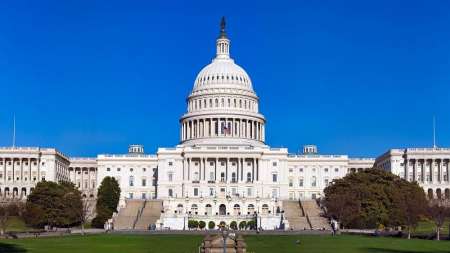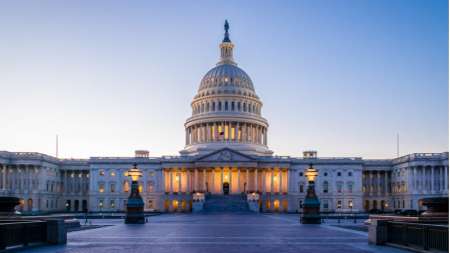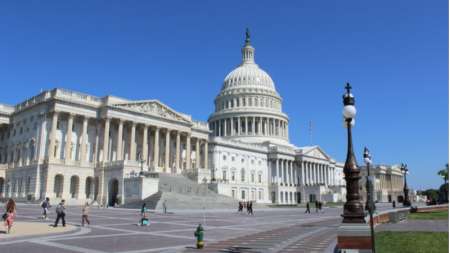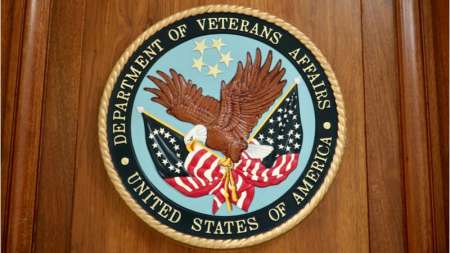A bill that was hailed by the Senate for its aviation safety provisions and unanimously passed, was shot down by the House in a narrow vote Tuesday after the Pentagon withdrew its support. […]
Rep. James Walkinshaw, D-Va., introduced a bill on Monday that aims to strengthen the Department of Veterans Affairs (VA) Veteran Employment Through Technology Education Courses (VET TEC) program, which supports veterans training to work in high-tech fields. […]
Companies that teach employees how to use and build artificial intelligence (AI) systems could receive a new tax credit for each worker they train under a bipartisan proposal introduced Wednesday by Reps. Josh Gottheimer, D-N.J., and Mike Lawler, R-N.Y. […]
Legislation introduced by Rep. Nathaniel Moran, R-Texas, on Feb. 11 would deny tax incentives to companies that use foreign adversary-controlled technology. […]
A bipartisan group of senators are pushing for a new modernized and digital environmental permitting system under a legislative proposal introduced Tuesday. […]
Federal workers would receive a 4.1% pay increase in 2027 under a new proposal introduced Tuesday by Rep. James Walkinshaw, D-Va., and Sen. Brian Schatz, D-Hawaii. […]
Rep. April McClain Delaney, D-Md., said she hopes to introduce new legislation within a month focused on standards for quantum technology and the development of a federal artificial intelligence (AI) regulatory framework. […]
Key cybersecurity bills aimed at securing the nation’s energy infrastructure and electric grid are advancing to the full House Energy and Commerce panel after passing out of the House Subcommittee on Energy. […]
Lawmakers on the House Oversight and Government Reform Committee on Wednesday advanced several pieces of legislation – with overwhelming bipartisan support – aimed at strengthening the federal cybersecurity workforce, streamlining procurement, and reducing national security risks in government supply chains. […]
Rep. James Walkinshaw, D-Va., is leading a group of House Democrats in a legislative proposal to pay all federal employees, service members, and contractors during any federal shutdowns in fiscal year 2026. […]
A bipartisan pair of representatives are proposing a federal identity fraud prevention innovation grant program for states to modernize their identity systems and create secure digital IDs. […]
A new legislative proposal introduced by Rep. Blake Moore, R-Utah, on Friday would use artificial intelligence (AI) to identify redundant and outdated rules in the Code of Federal Regulations (CFR). […]
The House on Jan. 20 voted to approve the AI for Main Street Act, which would direct the U.S. Small Business Administration (SBA) to provide a range of help to small businesses that are looking to implement artificial intelligence (AI) technologies. […]
New legislation introduced in the House would block the use of China-controlled apps on federal government devices. […]
New legislation filed in the Senate would instruct the Defense Department (DOD) to redouble efforts to recruit and retain members of the agency’s cybersecurity workforce and help address a double-digit percentage shortfall in DOD’s total cybersecurity employee rolls. […]
Rep. Jay Obernolte, R-Calif., will soon be introducing legislation to codify the Center for Artificial Intelligence (AI) Standards and Innovation (CAISI) to make permanent its work on AI evaluations and standards. […]
A new Senate bill would direct the U.S. Small Business Administration to provide a range of help to small businesses that are looking to implement artificial intelligence (AI) technologies. […]
A new bill from Sen. Tom Cotton, R-Ark., would let artificial intelligence (AI) data center companies bypass federal electricity regulations by building their own independent energy infrastructure. […]
A bipartisan group of senators is taking another stab at the National Quantum Initiative Reauthorization under a new version of the legislation introduced Thursday. […]
The Senate today passed the fiscal year (FY) 2026 defense authorization bill, voting 77-20 to send the measure to President Donald Trump, who has said he will sign it. […]
A new legislative proposal introduced in the House and Senate would establish a tax credit for employers who invest in employee training on emerging technologies, such as artificial intelligence. […]
House Homeland Security Committee Chairman Andrew Garbarino, R-N.Y., said on Tuesday that Congress may need to do another short-term extension of a critical cybersecurity information-sharing law. […]
The Department of Veterans Affairs (VA) would be required to inventory and keep track of its software and digital services under legislation introduced in the House last week. […]
The House voted Monday to re-pass bipartisan legislation aimed at improving how the federal government purchases and uses software. […]
The conferenced version of the fiscal year (FY) 2026 National Defense Authorization Act (NDAA) gives the Pentagon’s UFO sleuths three specific mandates, including expanded briefings to Congress. […]
Bipartisan legislation introduced in the House and Senate would direct the Office of Personnel Management (OPM) to create a centralized artificial intelligence (AI) and technology talent hiring team to streamline federal tech-related hiring. […]
After months of negotiations, the compromise version of the annual defense policy bill is in – but it left out a proposed artificial intelligence (AI) moratorium and reauthorization of the Technology Modernization Fund (TMF), instead including major cybersecurity and AI amendments. […]
House and Senate negotiators reached a compromise on Sunday evening for the fiscal year 2026 National Defense Authorization Act (NDAA), a sweeping defense bill that makes a major push to reform defense acquisition while adding a slate of cybersecurity provisions, measures to advance military innovation, and a new joint drone program. […]
A group of Democrats are reviving legislation that would restrict the use of biased and discriminatory artificial intelligence (AI) algorithms in making critical decisions in Americans’ lives. […]
A bill introduced in the House this week would task the Office of the National Cyber Director (ONCD) with “formally” identifying foreign agencies, people, and other groups that are responsible for recent attacks against the United States and directs a separate effort to improve the current distribution of attack attribution data. […]
























